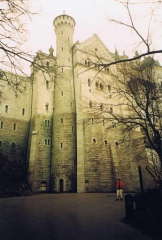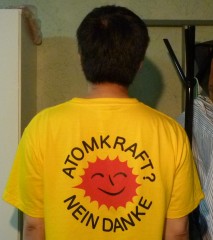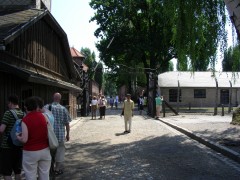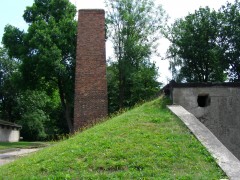14 November 2014
Deutscher film "Ludwig II" Mad, kind and gay king
Biographic story of Bayern king in 19th century Deutschland (Germany).
A young Ludwig succeeded Bayern crown after sudden death of his father.
Unlike his father, he never liked war and loved music and art. He believed art and music could maintain the peace but at the same time he had to struggle with the reality of the world.
Ludwig admired a opera music composer, Wagner. He became a patron for him. He liked Wagner's most famous opera "Lohengrin." He was a romantist.
But his kingdom faced wars and its sovereignty was weakened by defeats of the wars.
Then he tried to escape from such harsh reality and in his late years he ordered to build his own imaginative castle Neuschwanstein. Neuschwanstain was modeled after the castle on "Loengrin" stage. In Japan it is famous for model of Cinderella castle in Tokyo Disneyland.
I visited Neuschwanstein in April, 1995. Before visiting the castle, I went to Ludwig's home castle nearby. Luckily I was the only visitor so I could speak with the local guide about Ludwig's life. She told me the relationship between his dynasty and commoners was not bad so there was no bloodshed revolts like France. I asked if Ludwig was gay. The guide just laughed. Actually he was and that thing was portrayed in the film.

It was of course, a taboo in his society at that time. He struggled with that thing as well.
Lesson of this biography is no one can avoid reality. We all have to deal with it. If you try to escape from it, in the end you will be like Ludwig.
But art and music are really important in our real life and energize us.
Wagner's "Lohengrin" and Neuschwanstein in fact became German's most glorious heritages. Ludwig indeed contributes to his nation even after his death.
00:37 Posted in Art, Deutschland, Film, Music, Politics | Permalink | Comments (0) | Tags: history, gay
26 June 2013
German Film "Das Schönauer Gefühl" ATOMKRAFT? NEIN DANKE!
Recently I have become a big fan of Germany, Deutschland.
The documentary film I saw represents one aspect of that.
Germany has recently decided to terminate operation of all of nuclear power plants in their country until 2022.
German people started heated movement of non-nuclear policy after Chernobyl accident in 1986.
The film described non-nuke and self-sufficient power generation movement of people living in one small town, named Schonauer. After going through fierce battles with big power company and debates and referendums among localies, they established their own power generation system and company.
Germany is indeed very sophisticated society. German people are so enthusiastic about civil activities.
Since Fukushima accident, Japanese citizens are learning what Germans did and are doing.
I am one of student of German experiences.
Ich bin Deutsch!! Danke schonn!!
The below photo is me in German logo T shirt, that says "Nuclear? No Thank You."

The below video is what I took at the anti-nuke event in September 2011. One German anti-nuke activist made a speech on the stage to tens of thousands of audience attending.
22:54 Posted in Deutschland, Film, Society | Permalink | Comments (0) | Tags: documentary, nuclear power
14 August 2011
Book: "Letters from Berlin" written by a Japanese woman who lived in West Germany during Chernobyl crisis
The book is letter format. A writer named Chikako Yamamoto's wrote her experience of life in West Germany during Chernobyl nuclear crisis between April 1986 and 1989.
During that time she lived in West Berlin. What she experienced had many similarities to my current life in Tokyo, or surprisingly even worse. Tokyo is 220 kilometers away from Fukushima, but West Berlin is 1200 km away from Chernobyl. But radioactives Germen had to deal with was the same or even worse than Fukushima. Is it because Chernobyl disaster was much worse and more wide-spread or what we've been told since Fukushima crisis was censored by the authorities?
The life in West Germany was dramatically changed since Chernobyl accident occurred. The newspaper was occupied by radioactive related matters.
In contrast as time passed by, people tried to adopt to such changed environment and not to pay attention to serious matters although food they ate had been kept contaminated.
West Germany at that time censored the reports on radioactives and supressed anti-nuke activities because at that time West Germany took pro-nuke policy. But some citizens stood up and started to fight against oppression.
Similar phenomenons have been happening here in Japan.
However, because this is quarter century after Chernobyl, we may have been a little wiser, I hope.
Japanese Prime Minister, Naoto Kan declared "Less dependency on nuclear energy" policy on August 6, the day of Hiroshima nuclear bomb day. It is like modeled after Germany's decision of abandoning all nuke plants in that country by 2012.
Now only 1 third of Japan's nuclear power plants are operated currently. No re-operation is scheduled at this point. Local governments of where nuke plants are located are very reluctant to OK re-operation.
Japan's Parliament decided to pass the law that promotes more use of renewable energy, so called FIT (Feed in Tarrif). This is modeled after Germany's system as well.
We have to learn a lot from Germany's experience, like we did in the past such as imperial constitution and ground force military system in late 19th century and how to recover relationship with neighboring nations which we invaded during the second world war.
Deutschland, be our good model. Danke!
14:14 Posted in Books, Deutschland, Ecology, Japan News | Permalink | Comments (0) | Tags: nuclear power, fukushima
22 July 2010
German film"Triumph des Willens" Art of Propaganda
Nazis' propaganda film directed by female director, Leni Riefenstahl. It means "Triumph of the will."
The footage was recording of Nazi's party convention in September 1934. I bought a book on Hilter, that came with DVD of the old film.
It was in fact, fascinating and well-done. The film contains modern technique of propaganda.
Not just focusing on Hitler and his subordinates but young party members who attended the convention.
It looked like all the people in the convention were unified under the same spirit.
Of course, I should never say it was a great movie. Nazis were wrong.
However when it was first released in public, no one would never predict hollocaust would happen by them.
The important thing is how we defend ourselves from such brainwashing.
We have to watch out not to happen again.
The below is me at Auschwitz 2 years ago. The other one is chimney pipe of the 1st gas chamber.
20:36 Posted in Deutschland, Film, Media | Permalink | Comments (0) | Tags: history, nazis







